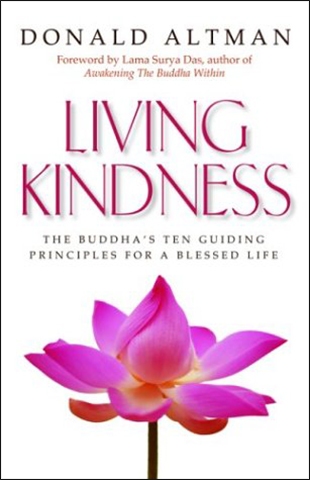Donald Altman is the author of Art of the Inner Meal. He is a Buddhist devotee and former monk, ordained in the Theravada school of Buddhism and trained by the Venerable U Silandanda. In this paperback, Altman explores the manifold meanings of the Ten Paramitas. He calls this a journey into "living kindness" — "kindness with the power of mindful action behind it. Rather than being reduced to a 'random acts of kindness' bumper sticker, this kindness is uniquely boundless, purposeful, and empowering. It is also more open and forgiving than the self-sacrificing kindness that I learned about in Sunday school. Living kindness is a vehicle by which our love, generosity, and other vital values make contact with the real world. This is kindness where it counts."
Altman is open to the insights and virtues of other religions, and he includes stories and illustrations from a broad range of faith perspectives and authors. The chapter on generosity, for example, includes wisdom from Buddhism, Judaism, Islam, the Native American giveaway, and the movie Pay It Forward. One of our favorites is on giving: "My wife's grandfather gave away half of his lunch every day of his life. He would either find someone to give it to or leave it for the birds and critters to eat. Giveaways do more than unburden us. They make us aware of what we can give back, all the time reminding us not to waste the precious gifts that are ours."
We were especially taken by Altman's insights into the wisdom of patience and the ways in which expectations and habitual ways of thinking can sprout the seeds of impatience, intolerance, and anger. The chapter presents suggestions on how to stay clear of criticizing and to cultivate compassion for our own flaws and foibles. To spice things up a bit, he includes the following: “An ancient story from the Jewish Talmud tells about the time two men made a bet whether Hillel, the wise and famous rabbi, could be made to lose his patience. One of the men waited until late Friday — the sacred Sabbath night — and interrupted Hillel as he prepared for his day of rest. Three times the man knocked at Hillel's door, and each time he asked a silly, if not trivial, question. And yet each time, Hillel respected both the questioner and the question with a worthy answer. This was just too much for the man to bear, and at last he blurted out that Hillel's patience had just cost him a large sum of money. Again, the rabbi calmly answered that the value of patience was worth much, much more than any worldly sum.”
